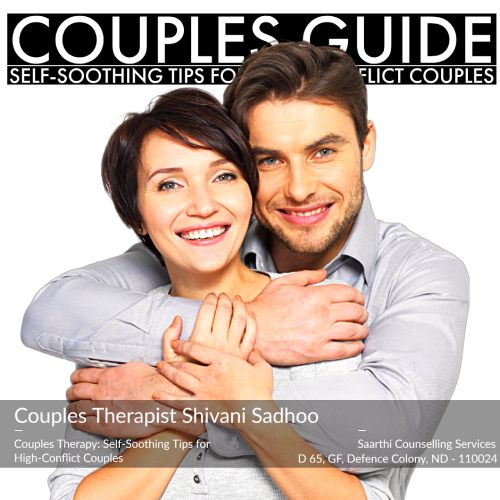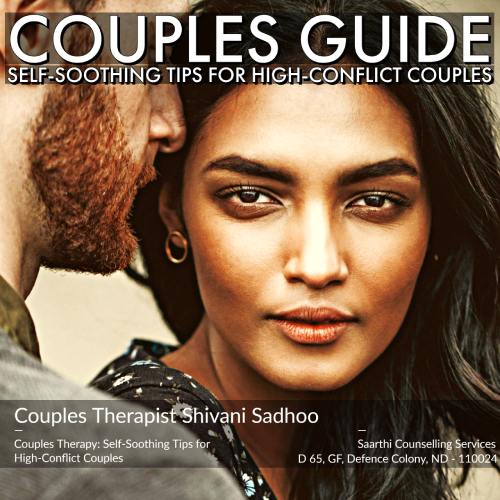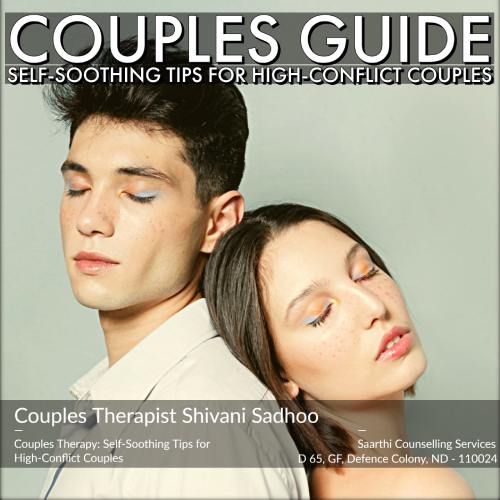Self-Soothing Tips for High-Conflict Couples
Shares Delhi’s Top Marriage Counselor Shivani Misri Sadhoo
In any relationship, conflict is a natural occurrence, and it is not uncommon for things to escalate, even in healthy partnerships. Navigating through an environment that often feels chaotic and confusing can be challenging.
It is important to understand what high conflict looks like and to develop specific strategies for self-soothing during and after such intense situations. Read this blog by India’s top marriage counselor Shivani Misri Sadhoo on how to self-soothe if as a couple there is a high conflict.
What Does High Conflict in Couples Feel Like?
High conflict can be overwhelming for your nervous system, as it triggers a strong response in your body. The stimuli become loud and intrusive, leading to a flood of emotions and physical reactions. You may notice sensations such as increased body heat, muscle tension, a clenched jaw, and a racing heart rate.
In these moments, accessing the rational part of your brain becomes challenging. This is because when you feel emotionally or physically unsafe, your brain tends to operate from the instinctual part, activating the fight, flight, freeze, or fawn response.
Although it may seem like conflict arises out of nowhere, there is often a buildup that leads to those intense moments. Tensions may have been simmering for a day or even longer, without finding a resolution.
To avoid reaching this point, it is crucial to address smaller issues as they arise and create dedicated time to tackle larger ones instead of avoiding or ignoring them. By consistently addressing and resolving conflicts as they come up, you can prevent them from accumulating and escalating into high-conflict situations.
You Find Yourself In A High Conflict, Now What?
Even with the best intentions, finding yourself in a high-conflict situation can happen. In such moments, it is important to take immediate action. Begin by identifying the shift in the conversation. Often, these discussions start off on a reasonable level and gradually escalate, making it challenging to recognize the shift right away.
To help identify where you are in the conflict, consider asking yourself the following questions:
- Are you having difficulty processing what is being said?
- Are you merely listening to respond rather than listening to understand?
- Are you and your partner engaging in name-calling or displaying aggressive behaviors, such as invading personal space, yelling, throwing items, or engaging in unwelcome physical contact?
If you answer yes to one or more of these questions, you are indeed in a high-conflict situation.
Once you’ve recognized the situation, take a moment to acknowledge this realization and promptly change your environment. Let your partner know that you feel the conversation has become unproductive and that you need a break. Find a different room or step outside to get some fresh air.
In your new environment, begin practicing deep breathing. Take slow, intentional breaths by inhaling through your nose for a count of 4, fully extending your torso, including your back. Hold your breath for a count of 2, and then exhale slowly through your nostrils for a count of 6. Repeat this process as many times as necessary.
Next, reinforce your inner strength and grounding by reminding yourself of your truths through affirmations. Here’s an example to get you started: “I am present in my body, I am deserving of love and respect, and I am supported and grounded.”
These three steps—changing the environment, practicing deep breathing, and engaging in self-affirmation—can effectively break the cycle of the instinctual brain response. By consciously implementing these techniques, you can regain control over your emotions, promote a sense of calm, and create space for productive and respectful communication to resume.
How to Self-Soothe?
Once you have regained access to your “smart” brain, you can choose from various self-soothing techniques to further calm yourself:
- Self-soothing touch: One effective method is to give yourself a comforting hug. Sit upright, stretch your arms wide as you inhale, and then cross your arms around yourself with your right arm underneath on the exhale. Take three deep breaths in this position before releasing your arms and repeating the process, this time with your left arm underneath.
- Listen to calming music: Select soothing music that helps calm your nervous system and bring your heartbeat back to a normal rhythm. Opt for tunes with a slower beat to promote relaxation.
- Go for a mindful walk: Engage in a mindful walk by immersing yourself in the present moment. Observe your surroundings with all your senses, taking in the sights, sounds, and smells without passing judgment or getting lost in thought.
- Engage in your favorite self-care activity: Dedicate time to indulge in activities that bring you comfort and relaxation. This could include taking a warm shower or bath, practicing your favorite stretches for relaxation, engaging in guided meditation, or surrounding yourself with pleasant scents like lavender.
By incorporating these self-soothing techniques into your routine, you can further enhance your ability to calm your nervous system and regain a sense of control and stability during high-conflict situations. Remember, self-soothing is a personal process, so feel free to explore and experiment with different techniques to find what works best for you.
In high-conflict situations, recognizing the problem, practicing self-soothing, and creating a conducive mindset for nonjudgmental conversation are crucial for finding lasting resolutions. Seeking assistance from a couples therapist specialized in conflict resolution can be beneficial. The Gottman Relationship Coach program, “Making Up After an Argument,” provides guidance for managing overwhelming conflicts.
The Gottman Relationship Adviser offers a comprehensive tool for improving relationship health through personalized plans. The Gottman Assessment provides in-depth insights into relationship dynamics. Seeking external support and utilizing these resources can nurture a healthier and more resilient partnership.
- Does Living with In-Laws Affect Your Marriage? 5 Ways to Deal - July 23, 2024
- Is Your Job Destroying Your Marriage? 7 Signs to Look for - July 15, 2024
- Do you Know How to Handle a Manipulator Effectively? - July 11, 2024


